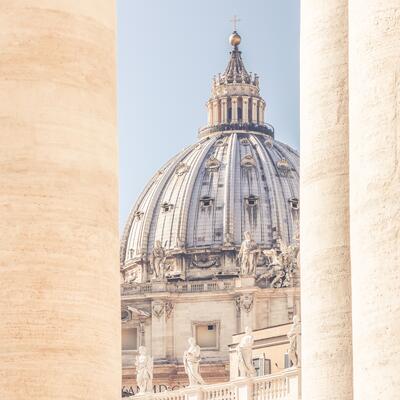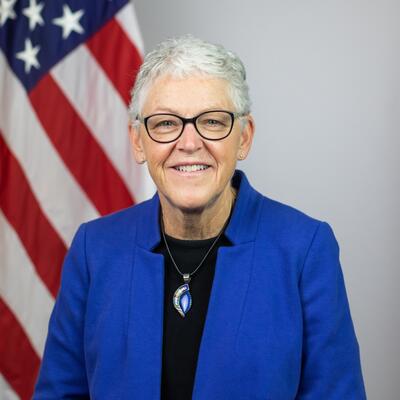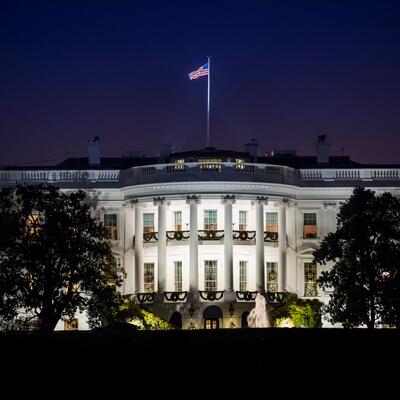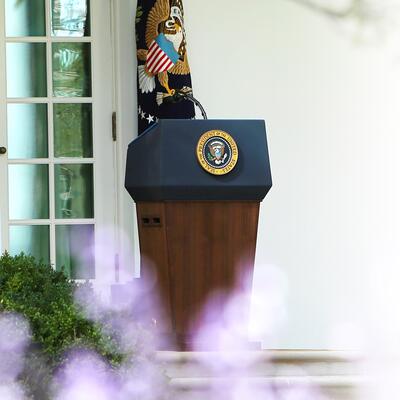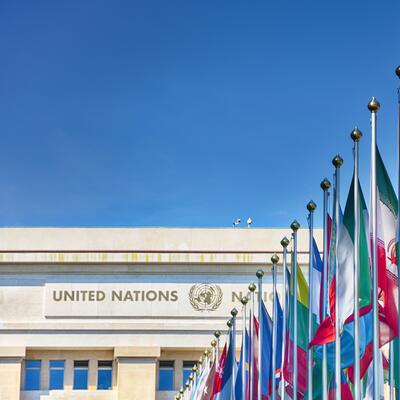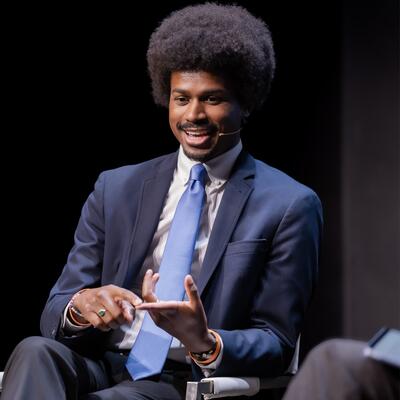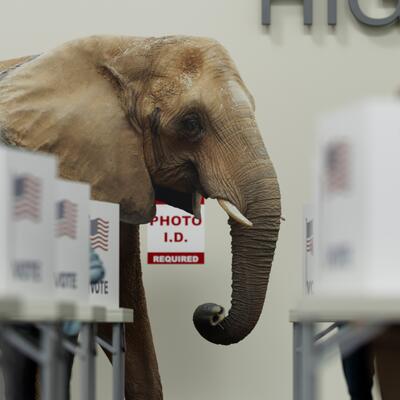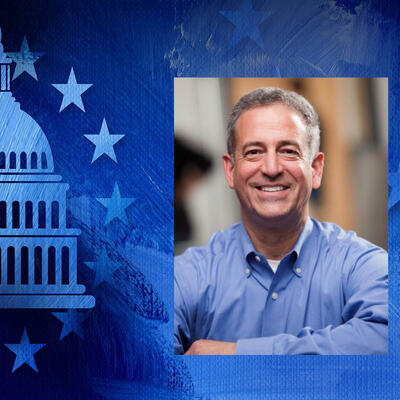
Russ Feingold on Biodiversity, Climate and The Courts
Guests
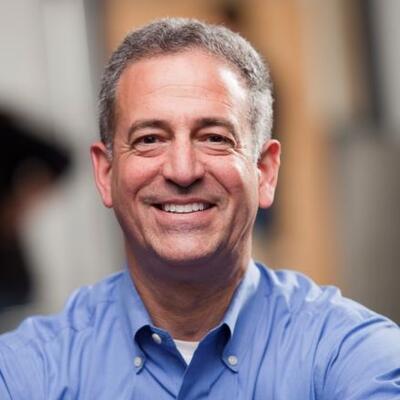
Russ Feingold

Jean Su
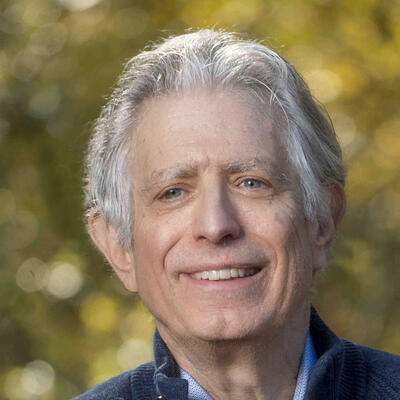
Dan Farber
Summary
Historically, the United States has been the world's biggest carbon emitter. That legacy puts a certain onus on the U.S. to be the world leader in addressing the climate crisis. In order to do that, our elected representatives need to make climate a priority.
Russ Feingold became a household name co-authoring the Bipartisan Campaign Reform Act, more commonly known as McCain-Feingold. There was a time when climate wasn’t a partisan issue. Feingold reminisces about long-gone bipartisanship: “On so many issues a lot of the Democrats and Republicans were willing to work together and that's how Gaylord Nelson was able to pass as a senator the Clean Water Act… Richard Nixon created the Environmental Protection Agency. It’s not like he was an anti-environmentalist, but things sharply changed, at some point in the late 2000s. And I think we both know what it was. It was a direct attempt to take climate out of the sphere of bipartisanship and to turn it into a partisan bloodbath led by some very powerful corporate interests.”
The courts play a major role in how the climate crisis can be addressed – from defining EPA authority to allowing unlimited spending in political campaigns. Many have pointed to the leaked Supreme Court draft decision overturning Roe v. Wade and Planned Parenthood v Casey – long considered settled law – as demonstrating how the current conservative majority could reverse other decisions such as Massachusetts v. EPA, which ruled that the agency can regulate carbon emissions under the Clean Air Act.
Two options to shift the makeup of the Supreme Court are expansion of seats on the court, and instituting term limits. Discussing his work with the American Constitution Society, Senator Feingold states: “We support both of those kinds of measures to do something about the damage that the court is doing, including recently in the environmental area.”
Senator Feingold is also shining a light on another climate-related crisis: the loss of biodiversity. He believes, “The threats posed to people from the destruction of nature are just as serious as those posed by climate change.”
The legislative and judicial branches are not the only ones who can act on climate. The president has executive powers available to him, such as the Defense Production Act, or DPA. Jean Su, Senior Attorney and Energy Justice Director at the Center for Biological Diversity, describes the DPA:
“Historically the Defense Production Act was a statute that was passed to help the United States manufacturing base prepare for the Korean War. So back in the day, it was a powerful tool to allow the president to command private companies and coordinate private companies together to manufacture weapons like tanks, like guns that the American military would need overseas.”
Su believes the DPA can be used to increase the manufacturing of clean energy products:
“DPA is a tremendous tool that the president can pull right now to coordinate private companies together. This is our chance to manufacture solar panels, wind turbines, EVs, storage, and all the structures that we need to essentially transition our country off of fossil fuels.”
Related Links:
https://www.acslaw.org
Contested Ground: How to Understand the Limits of Presidential Power
https://www.biologicaldiversity.org
Full Transcript
Greg Dalton: This is Climate One. I’m Greg Dalton. A functional democracy is vital to ameliorating the climate crisis. What happens when the right to vote comes under attack?
Russ Feingold: If you're able to repress the vote in a way that people that are committed to these issues can't get elected and you keep electing a majority in state legislatures and in Congress that is totally beholden to the fossil fuel industry, you won’t get anywhere.
Greg Dalton: If congress won’t act, can the president?
Jean Su: The president has a tremendous amount of executive powers. Some of those are emergency powers but many of those are actually ordinary powers. He can actually take many steps in banning fossil fuel leasing or at the very least, reducing the rate at which it's happening right now
Greg Dalton: Biodiversity, Climate and The Courts. Up next on Climate One.
Greg Dalton: This is Climate One, I’m Greg Dalton. Historically, the United States has been the world's biggest carbon emitter. That legacy puts a certain onus on the U.S. to be the world leader in addressing the climate crisis. In order to do that, our elected representatives need to make climate a priority. Yet at the same time, voting rights are being restricted for the very communities most affected by the climate crisis: Blacks, indigenous Americans, and people of color. Climate issues are also being decided by the courts, where ordinary citizens have much less direct impact. When so many levers of power are pulled in the wrong direction, can a broken democracy heal a broken climate? While serving as a U.S. Senator for Wisconsin, Russ Feingold became a household name by co-authoring the Bipartisan Campaign Reform Act, more commonly known as McCain-Feingold. It took effect in 2002 and was the only major piece of federal campaign finance reform passed into law in decades. In that political era climate action also had bipartisan support. John McCain and Barack Obama were in basically the same place when it came to climate issues in 2008. That same year, a TV ad featured Nancy Pelosi and Newt Gingrich sitting on a couch together.
[Start Playback]
Nancy Pelosi: Hi, I’m Nancy Pelosi. Lifelong Democrat and speaker of the house.
Newt Gingrich: And I'm Newt Gingrich. Lifelong Republican and I used to be speaker.
Nancy Pelosi: We don’t always see eye to eye, do we Newt?
Newt Gingrich: No. But we do agree, our country must take action to address climate change.
Nancy Pelosi: We need cleaner forms of energy and we need them fast.
Newt Gingrich: If enough of us demand action from our leaders, we can spark the innovation we need.
Nancy Pelosi: Go to wecansolveit.org. Together we can do this.
[End Playback]
Greg Dalton: I asked Senator Feingold what he felt when he watched that ad.
Russ Feingold: Well, it makes me very sad to think about the fact that we don't have that kind of cooperation now. Speaker Gingrich was not the easiest guy to get along with on issues but the fact that Speaker Pelosi and Speaker Gingrich were able to come together in this reminds me of really frankly what I grew up with, which was a Wisconsin tradition. We had Republicans and we had Democrats, but when it came to the thing, we called conservation before we called it environmentalism everybody just put aside those differences. Our famous governors, Warren Knowles, Gaylord Nelson, both governors, one Republican, one Democrat were symbols of the cooperation on these issues. Preserving natural lands, it just wasn't a partisan issue. And when I got to Congress it was still that way. I got there in 1992, but on so many issues a lot of the Democrats and Republicans were willing to work together and that's how Gaylord Nelson was able to pass as a senator the Clean Water Act, the endangered species act and clean air act -- Richard Nixon created the Environmental Protection Agency. It’s not like he was an anti-environmentalist, but things sharply changed, Greg, at some point in the late 2000s. And I think we both know what it was. It was a direct attempt to take climate out of the sphere of bipartisanship and to turn it into a partisan bloodbath led by some very powerful corporate interests, which I'm sure we'll talk about. But it really changes things to the point where we have a really bad divide in this issue and almost nothing seems to get done at least at the national level with regard to climate change.
Greg Dalton: Yeah, so much was happening around that time, 2006 to ’10. And I believe Freedom House which charts the freedom of governments around the world, they started to see a decline in free democracies around the world around that ‘06 and it shrunk then. One other big thing there 2010, the Supreme Court handed down Citizens United that undid the 2002 McCain-Feingold restrictions on campaign finance and allowed unlimited funds to be poured into elections. How do you connect that with what other changes the fossil fuel companies, things that are going on at that time?
Russ Feingold: Well, you're right, it was the rise of the tea party as President Obama was coming into office that somehow became identified not only with being against the healthcare bill it hadn't even been introduced yet in claiming that President Obama was born overseas. But a third part of it was a concerted attack that I have witnessed personally on any attempt to try to do something about this legislatively. The so-called cap and trade legislation were attacked as a socialist plot that would destroy the economy. So, as I did these town meetings in 2009 and 2010, I was shocked at the disinformation. This is key because the disinformation as we know right now is a big part of the overall authoritarian strategy in the world and the attack on democracy. This was one of the first experiments with it led by the tobacco companies first, with regard to smoking.
Greg Dalton: Right. And we saw that there and then, yeah, the rise of the tea party. Do you think that people of color would often say that they knew that electing a black man would bring a big racial backlash? What part do you think race played in that?
Russ Feingold: I'm sad to say that I think race played way too much a part. I literally made a promise when I ran for the U.S. Senate in 1992 that every year I would go to each of Wisconsin’s 72 counties, and hold an open town meeting and we did it for 18 years. But all of a sudden after Obama was elected before he was even sworn in, all of a sudden, all these angry people that I'd never seen before came in and started saying that he was a socialist and he was gonna do this and he was gonna do that. And they actually scared people away. People that came every year. They were always very mild sessions where if anybody served, they tended to be more liberals because of who I am but whenever somebody came in and was a conservative I made sure the crowd treated that person with respect. And all of a sudden, these things became screaming sessions. And you can see that across the country at that point. This was part of the strategy. Disinformation, disrupt public meetings where people could come together and yes, even in some of the rural counties where a lot of I thought a lot of liberals lived over near the Mississippi River. I remember some of the people that I understood to be progressives on the environment saying, hey, this climate change thing is a hoax.
Greg Dalton: Right. And of course, calling cap and trade a socialist plot is pretty ironic because cap and trade was the Wall Street-friendly version of tackling climate change. It was favored by big business.
Russ Feingold: Exactly.
Greg Dalton: Well, when President Obama came in, he famously decided to tackle health care first in his first term ahead of climate. Partly that was gas prices were very high, and people were angry. Now, President Biden once again is putting the transition to cleaner energy a bit to the side as he looks to the midterms and worries about high gas prices. So, what do you think about the political calculus right now of, we got to drill more, increase fossil fuel supply get prices down? Climate is important, but we can't put it first right now.
Russ Feingold: Well, you're right. This just keeps happening and it's incredibly important that we deal with the climate issue as well as I might add the biodiversity issue which is a related issue that was also an outgrowth of the Rio conference in 1992 where those treaties were initiated. And somehow these things get put on the back burner and you can understand why. Look, I know when Barrack Obama became president, I knew that he was on the right issue on healthcare because every year for 18 years that I did town meetings healthcare was the thing that people most mention. Problem with the climate issue as you know, even though there are heroic efforts by people like Al Gore and others to make it sort of accessible is that it is more complicated. It's harder to connect to on a day-to-day basis. You can see the strange things going on with the climate, but it's so heavily laden with science and complexities that it's real fertile ground if people want to try to distort things, particularly when something like this might involve sacrifice. If you can convince people you know you don't really need to do this. There's always been climate change. It's no big deal. Well, people would rather hear that than that they’re gonna have to sacrifice for it. And so, it creates kind of a Sisyphus kind of situation where you keep pushing this boulder up the hill.
Greg Dalton: Yeah, the costs are today and the benefits are in the future and we’re not very good at that in our political culture. Like we want benefits today and the cost tomorrow or never.
Russ Feingold: I believe fervently in democracy but you're right. The fact that we do have these regular elections, and we’re frequently changing hands. It's very hard for political people to be able to sit down and draft up a long-term vision. Frankly, the Chinese are much better, but they do it in a very autocratic way that ultimately may backfire because they're trying so hard to preserve the dominance of the party. But they are able to exude an environmental or industrial or foreign-policy out 10, 15 years. So, this is one of the great challenges of democracy in this interdependent age is how do you plan forward when you know that it could go back and forth. We may have another huge shift this year politically, that could stop in the tracks even what President Biden is trying to do in this area.
Greg Dalton: Right. And you spent a lot of time on foreign affairs, particularly Africa. Right now what's happening in Ukraine is roiling energy markets, it's changing geopolitics, it's changing domestic politics. There's a real debate on whether it means more drilling more fossil fuels or does it mean pivot to green and more renewables. How do you see that dynamic and that playing out right now, both internationally and domestically? There's a great moment of transition and turmoil.
Russ Feingold: You know, there’s an element of it that I'm optimistic about and that is the 10, 15 years ago, people said you know solar and all this stuff it’s never going to work it’s never gonna turn a profit. That’s not true anymore. There are all kinds of places, all kinds of companies that are finding it to be not only useful but lucrative in some cases. So, we’re in a better position to not kid ourselves that the only way to do it is through fossil fuels, but the fossil fuels industry still has such a domination over our political process because of the bias in our political process that is not based on the majority of people. That still gives a huge advantage to fossil fuel industry being able to defeat serious measures whether federal or state level. And that's a political problem and a legal problem as well as an environmental problem.
Greg Dalton: When President Biden was a candidate, Biden, he was kind of moderate on climate. He moved as a candidate got a lot more in tune with environmental and climate justice. You bucked your party at times and were kind of a bit of a maverick at one point, you are the only Democratic senator who voted against your party on a procedural motion during the Clinton impeachment. How do you look at Democrats on the left now, whether it's the squad or Sunrise who are trying to push the party faster toward fossil fuels, is that jeopardizing reaching swing voters and swing districts? How do you see that?
Russ Feingold: I believe that pushing on the climate issue as well as biodiversity in the end is a winner with voters. And it would be a mistake for progressives whether a Republican or Democrat to back away from it. I still think there is a fundamental commonsense view that this is worth doing. The problem with the fossil fuel industry is not so much what they're able to do during an election. It's what they're able to do after the election, when people get elected. So, in terms of election strategy, I think people should be plenty firm and strong with regard to the vital need to act aggressively with regard to climate.
Greg Dalton: Redistricting is happening this year a lot happening in the court, you're focused on the court somewhat. How do you view what's happened in the courts with regard to redistricting and the kind of battling over the rules of the next election?
Russ Feingold: People wonder how is it that you know the majority of people believe that climate change is a serious problem and the majority of people want various environmental measures. How is it that that's the case, and that you still end up with legislatures all over the country that are hell-bent on preventing serious climate change legislation. In fact, we had incidents here in Wisconsin, where they would even try to make sure that nobody in the state government was allowed to mention the phrase climate change, including the daughter of former Senator Gaylord Nelson, the founder of Earth Day. They tried to punish her for that. How does that happen? Well it's through reapportionment. It's through gerrymandering. Let me give an example. You know, we had a Republican governor and a Republican legislature consistently from 2010 to 2018 and they did lots of bad things. Undoing labor movement undoing collective bargaining. But in 2018 the Democrats had a good election. They won the governorship here the lieutenant governorship. The state treasurer and the Atty. Gen. It was a clear Democratic majority. Guess what? In the legislature not only did Democrats not pick up ground they lost ground in both the House and the Senate the assembly in the Senate. The same voters. Why is that? Because the districts were in a partisan way redone so that the votes of Democrats, particularly African-Americans in the southeastern part of the state were minimized. And a case was taken all the way to the United States Supreme Court based on the Wisconsin case as well as others saying, you know, this is something that shouldn't be allowed and unfortunately, this court is in so many other cases said no, actually you know, that's fine. You can do it on a partisan basis. So, what happened is, even though clearly a majority of the people in this state want action this area, it can't get done. And so, now the Supreme Court has intervened again as we’re about to have the decision made about what the lines are gonna be for the next 10 years. And in this case, Greg, our Wisconsin Supreme Court did the right thing at first. One of the conservative justices said this isn’t right and he voted with the progressives and he said with regard to the state legislative program the governor’s plan should be used. Well guess what. The United States Supreme Court and the shadow docket without even having oral argument without even really having a briefing quietly struck it down and went back to the Supreme Court they went the other way. So, what does that mean? 10 more years of the frustrations of the will of the people of Wisconsin 10 more years of gerrymandering and 10 more years of very unlikely progress on environmental issues including climate change.
Greg Dalton: You’re listening to a Climate One conversation about climate and democracy. My guest is former US Senator Russ Feingold. Our podcasts typically contain extra content beyond what’s heard on the radio. If you missed a previous episode, or want to hear more of Climate One’s empowering conversations, subscribe to our podcast wherever you get your pods. Coming up, shining a light on another climate-related crisis: the loss of biodiversity.
Russ Feingold: The two issues should be linked and that there should be more awareness of biodiversity at which I actually hope will somehow be more bipartisan than the climate one has been.
Greg Dalton: That’s up next, when Climate One continues.
Greg Dalton: This is Climate One. I’m Greg Dalton, and we’re talking about climate and democracy with Russ Feingold. In addition to being an Honorary Ambassador for the Campaign for Nature, Feingold is President of the American Constitution Society, a network of progressive lawyers. The courts play a major role in how the climate crisis can be addressed–from defining EPA authority to allowing unlimited spending in political campaigns. We taped our conversation with Senator Feingold before the leaked Supreme Court draft decision overturning Roe v. Wade and Planned Parenthood v Casey. Many have pointed to this as an example of the continued politicization of the nation’s highest court. It’s also worth pointing out that overturning those cases – long considered settled law – might demonstrate how the current conservative majority could reverse other decisions such as Massachusetts v. EPA, which ruled the agency can regulate carbon emissions under the Clean Air Act. I asked Feingold what can be done about the power of Supreme Court justices–like expanding the court or instituting term limits.
Russ Feingold: We at the American Constitution Society think that there is a momentum for this. And, you know, the president had a commission about judicial reform. And some of the people went into it thinking that well it's not a good idea to expand the court. Well, some of the most prominent people that felt that way changed their mind, particularly Nancy Gertner and Lawrence Tribe, two of the most distinguished constitutional lawyers from Harvard Law School. They wrote an op-ed afterwards saying, you know what we thought maybe term limits would be better and by the way, we support term limits for members of the Supreme Court, but they also concluded that the only way to undo the packing of the court that was done by Trump and McConnell is to add some seats, which of course is perfectly constitutional it can be done, and has been done in the past. And it's the only way to change the fact that essentially a seat was stolen from Obama and a state seat was stolen in advance from Biden. So, we support both of those kinds of measures to do something about the damage that the court is doing, including recently in the environmental area. And we also support internal reform, such as, you know, the court doesn't have ethics rules. The court doesn't have, and the court has the shadow docket that I mentioned it's being abused. It’s supposed to be for emergency situation. So, all of this sets the stage for real damage to the environmental issue as well as others. In fact, they use the shadow docket last week to undercut the Clean Water Act.
Greg Dalton: I spoke recently with Congressman Jamie Raskin. When I asked him what parts of the federal government are best empowered to take strong action on climate right now. He answered that it all comes back to Congress and the country's founders put the legislature in Article 1 of the Constitution as a former senator now focused on the courts. How do you answer that question about what part of government can best address climate?
Russ Feingold: I think Congressman Raskin is right. The purpose of the Congress is to address through legislation working with the president the problems that face our society. Of course, when it comes to the interpretation of individual rights and others that's more the job of the court. But, you know, John McCain and I spent eight years working together on legislation to reform our campaign finance system. And as you pointed out a court struck down, not our bill but actually but something else but did great damage because they didn't respect the role of the legislature an overwhelming bipartisan consensus on that issue. Well, the same thing goes for climate. If we just leave it up to a court. A court that is basically 6 to 3 based on the theft of two Supreme Court seats we’re gonna get nowhere.
Greg Dalton: And people on the left often point to the politicization of the court and activist jurists, and yet I also want to ask you if it was a mistake or appropriate for people on the left to make Ruth Bader Ginsburg a cultural icon. Documentaries, buttons, you know, she became kind of a you know a hero and a pop-culture figure. Is that appropriate for a justice does that contribute to the politicization and perhaps also her staying for longer didn’t work out so well in the end,
Russ Feingold: You know, I don’t think it’s a, she certainly deserves the accolades and the admiration that she got for her role in the court for her wonderful role model for women. I mean I don't have a particular problem with that. However, I do think the spectacle of her having to hang on when she was obviously very ill was part of the problem with the way our court is set up. And it’s one of the reasons we at the American Constitution Society support the idea of perhaps a 18 year term. In other words, a one idea that's out there and I think it’s pretty good is that every president should get to pick two justices once every two or more, two a term. That would create regularity and the person would not necessarily have to stop being a judge, they might be on senior status to the Court of Appeals, etc. I think it's time for that. Now, that may require constitutional memo. Unlike adding seats. It’s a debate I'm not sure I agree. I think it may not which will be of course very challenging. But I thought what happened with the wonderful Ruth Bader Ginsburg was a sign of something that clearly the founders didn't intend for somebody of that age and that health condition to have to hang on, literally for dear life, hoping that a different president we get to pick her successor. And that's where McConnell and Trump are simply craven by rushing through an appointment while people were already voting for the next president. That’s one of the worst things I've ever seen. It was wrong. They know it was wrong and it's not something I ever would have believed on either side. I was on the Judiciary Committee for four major Supreme Court appointments. And so, I went to that whole process. I never saw anything like this done by either side. Two of them were under Bush the second Bush. Two of them were under Obama. It was a civil appropriate process and that's been ruined.
Greg Dalton: Right. And certainly, you could argue well, Garland, like approvals in election years or yes do it close to an election, but it's hard to argue both of those. In Shelby County versus Holder, the Supreme Court struck down key provisions of the ‘65 Voting Rights Act in a 5-4 decision. How are the rollback of voting rights and environmental rights and protections connected?
Russ Feingold: Well, you got me wound up on reapportionment and you’re gonna do it again on Shelby County. So, look the Voting Rights Act heroic success of Lyndon Johnson and others after many years of tremendous effort had long been a wonderful bipartisan issue, like many environmental issues. The votes were overwhelming to reauthorize the Voting Rights Act, every five years. One of the most conservative Congressman in Wisconsin history James Sensenbrenner who considered me a pain in the neck and I considered him a pain in the neck most of the time, he was wonderful. And every time he would work meticulously to make sure a good Voting Rights Act was passed, and that happened again before Shelby County. Here, this unelected court this time led by Chief Justice Roberts sadly, decided to start dismantling it. They eliminated the preclearance requirement. And what’s that? Preclearance requirement was that certain places with histories of Jim Crow laws and racism had to get their voting procedures cleared in advance. He basically said, you know, racism is not a problem anymore in voting. Well, that unleashed a terrible torrent of anti-voting laws, including here in the state of Wisconsin trying to eliminate early voting trying to require voter ID limiting the number of polling places. Doing everything possible to make it difficult for people to vote in addition to the reapportionment and the gerrymandering that we've already talked about. And now they're doing more. Now they’re weakening other provisions of the Voting Rights Act. The Brnovich decision out of Arizona this past year they've made it very hard for people living on reservations and other places to have older, very elderly people having their ballots transported by somebody else in a secure way. And now they're talking about some of the justices eliminating the ability to enforce the Voting Rights Act through what's called a private right of action, which is where an individual as opposed to an attorney general can bring the case. So, this is a full-scale attack on the most fundamental right we have. And yes, of course it’s completely related to environmental and climate issues just like reapportionment. If you're able to repress the vote in a way that people that are committed to these issues can't get elected and you keep electing a majority in state legislatures and in Congress it is totally beholden to the fossil fuel industry. You won’t get anywhere. So, voting rights, repression and attack and voting rights is one of the most pernicious things in our society and it’s being led by the United States Supreme Court which is supposed to stand up for the right to vote.
Greg Dalton: The independent state legislature doctrine is a belief that state legislatures are the only governing bodies who can determine how elections are run with no input from state courts or governors. How serious a threat to democracy is the independent state legislature doctrine?
Russ Feingold: Well, whenever you hear one of these things the first time, you know, before you realize the money behind it and what they’re gonna do the federal society and others. You go that sounds crazy because it is crazy. The idea is that the legislature can simply make up the rules or take election results install election officials and that the courts in the states can't even review it. The idea that they do something that’s blatantly illegal aren’t constitutional, and the state court or the Supreme Court can't review it is absurd. And yet they're advancing it and there is a reason to believe potentially that as many as four of the members of the Supreme Court already support it. So, this would gut our democracy to be totally autocratic. It's a dangerous doctrine. I think it's totally wrong and it would undo essentially would undo the idea of our democracy at its core.
Greg Dalton: There is bipartisan support for reforming the Electoral Count Act. What impact would that have and is that kind of fighting the last war?
Russ Feingold: Well, you have to at least fight that war. It's not enough but at least there is bipartisan support for that. That would at least prevent the kind of stunt that apparently President Trump and his allies were trying to pull on January 6, for so many years we've been concerned about first getting people out to vote, encouraging people to vote. Then as you pointed out, we became concerned after Shelby especially Shelby County decision we became concerned about voter suppression trying to prevent people from voting. But now we’re in a whole nother world. The ballots have already been submitted. And people say, well, we don't like what they're saying about who won we’re gonna subvert the election we’re gonna have people put on electors for the electoral college that don't even believe in the results. And so, this is a whole nother level it even more dangerous level it frankly progressives have to step up to the plate and fight this at the precinct level. We have initiated a new program at the American Constitution Society the last few weeks to get people to pledge to be poll workers. Because a lot of our poll workers and a lot of these people have been doing this for 34 years, 30, 40 years wonderful local community people they’re scared to go to the polls because they think it might be a place where there's going to be a rough stuff maybe even violence. And so, we’re encouraging our lawyers and others to say I’ll volunteer and we need to do that otherwise this intimidation will grow. And one of the things I wanna point out is when you intimidate, you just intimidate poll workers. A lot of people, you know, lot of older people lot of people that aren’t used politics they look at that and they go, you know, I don’t think I'm gonna go down to that polling place I don't really feel that strongly about it. And that's how the big interests and those who want to suppress our society and even fascist interests can prevail.
Greg Dalton: Yeah, especially for people who are immigrants from countries that have different forms of government have some personal experience of repression etc.could easily be scared off by that. Most of our listeners are probably familiar with the Conference of Parties or COP on climate change. Last year it was in Glasgow. This year it's coming up in Egypt. But there's also a Conference of Parties to the UN convention on biological diversity which you’ve been deeply involved with. So, why is biodiversity so much less in the public spotlight than climate? They’re related but climate seems to get a lot of the attention.
Russ Feingold: If you can believe it, Greg, we’re like the only country in the world that hasn't ratified the convention on biodiversity. Russia’s done it. China's done it. China is hosting the conference in Kunming for this. So, it's very embarrassing, but it's because you need that two thirds vote in the Senate. Now the United States has recently joined what we call the high ambition coalition through our administration, which is trying to get the goal that established it in Kunming, kind of like the climate goal of 1.5°. This goal is that 30% of the planet, water and land will be preserved by 2030. Now the scientists say we may need to do more than that but it's based on a report done by a couple hundred top-notch scientists released in May 2019 that says that we’re gonna lose potentially a million species to extinction in the coming years. And the report says that the loss of biodiversity of course animals, but also plants and fungi and all kinds of things like that that that loss could be as serious as climate change. And of course, the two are totally interrelated. I mean if you look at the loss of the coral reefs, that's a loss of biodiversity caused significantly by the warming of the water. Vice versa. Damage to the climate if you have the exploitation of the Congolese forest, which is the second some people call it the second lung of the planet after the Amazon. You get rid of those trees, you don't just lose the biodiversity of the trees. It's no longer a sink for the CO2. It no longer does that. So, most of the people that I've talked to about this around the world and we are working as an international group agreed that the two issues should be linked and that there should be more awareness of the biodiversity at which I actually hope will somehow be more bipartisan than the climate one has been.
Greg Dalton: A lot of this and 30x30 saving 30% by ‘30 can be traced to Half-Earth it was a book by E.O. Wilson famed Harvard conservationist. So, you know, some indigenous people say like okay white guy at Harvard says we have to conserve half the earth like that's the way we’ve been living for thousands of years. Most of the remaining biodiversity is in the hands-on lands of indigenous peoples. Will they be part of this and how are they gonna be respected and incorporated in this process that is they have a lot more wisdom and experience than we do.
Russ Feingold: They are absolutely right. And in fact, it's interesting right that in 2010 because this sort of conference meets every 10 years to set the goals. This was not really considered. But now, ever since I've been involved with this for three years, there are three main principles. Number one is to achieve the 30x30 internationally. Number two is to make sure there's financing. You can't say to a country that Africa can’t feed its own people, well, why don’t you go and preserve this land and not feed your people. So, we have to have financing from wealthy countries. But the third principle is the protection and establishment of the rights of indigenous people. The famous first national parks in Congo. They kicked the indigenous people out. I've met with indigenous people in Uganda and others who have been displaced. And you're absolutely right. These are the people that know the most about it that know how to handle the diversity there, they have so much to teach us. So, a mechanism has been created through the campaign for nature and through the convention of biodiversity where lands where indigenous people are still living will be counted as preserved under certain conditions. In other words, the lands can’t be sold out to mining companies, you know, to mine the whole thing. But there has to be a major change in the attitude about the role of indigenous people and it’s one of the three fundamental principles that this campaign for nature is all about. And in fact, the negotiations are going on now. It's a stumbling block but they’re gonna get over it and the language needs to be very strong on protecting the role of indigenous people with regard to biodiversity.
Greg Dalton: About 12% of the US lands are protected under some form of protection now. There used to be another 18% or so to get to this 30% goal. In your state 82% of land is privately owned and in states like Nebraska and Kansas it’s 90– almost 100% of land is in private hands. Does that mean that private landowners are going to have their land taken away to be conserved?
Russ Feingold: No, it does not. And in fact, the president put out a wonderful report this year with his secretary of interior who’s the first indigenous person to ever serve in that position called the America the Beautiful plan that basically endorses the idea of 30x30 but it explicitly talks about working with property owners working with ranchers working with farmers. There are a lot of people here in my alma mater the University of Wisconsin-Madison who have gone around Canada and the United States working with ranchers saying look you can have wolves, you can have grizzly bears you can have these things right here in your land without giving up your private property rights. And they taught them how to do it. And apparently there's enormous enthusiasm. So, these two things don't have to be incompatible and lands that are still privately owned can be part of the solution here.
Greg Dalton: Our culture is deeply human-centered and declining biodiversity is invisible to most people. They don't see how a connection maybe they understand bees pollinate food they’re like, okay, that's a problem. How do you get people to connect and care about biodiversity when they don't see a direct personal connection?
Russ Feingold: It's hard, but there’s a couple levels to this. The truth is that if you have the continuing exploitation of agricultural areas, huge food shortages will occur throughout the world. These big palm oil forests or operations in Indonesia and others lead to the loss of biodiversity. And then you have the loss of pollination. I mean even one example even though people don't see this is apparently people who love guitars are very concerned about monkeys near ebony trees in Africa. Why? Because without the monkeys the seeds for the ebony trees don't get moved around and the ebony trees can't survive. So, sometimes it's a two-step thing. On the other hand, I think a lot of people realize that certain animals and certain things that used to be around aren’t around as much. In fact, I saw a study that since I was in high school 50 years, 1970, when Earth Day started, we've lost 30% of all the sort of normal birds you would see in North America 30% of them, they’re gone. And some people might say, well, there are some birds around, well, they’re not as many they’re used to be. On the other hand, through environmental efforts we have animals that we never had before cross the street from where I am right now there's a conservancy, sandhill cranes all over the place, wild turkeys. And so, it's a mixed picture where people might say well, you know, there's more than they used to be when I was young, but the fundamental concern about land usage and by not preserving enough it is ultimately very threatening to people's stability and to stability of our society.
Greg Dalton: Well, senator we have to wrap up there. Thank you for your time and for your thought and your inside in your leadership. It's been a pleasure.
Russ Feingold: It was fun. Thanks so much.
Greg Dalton: You're listening to a conversation about the relationship between the climate crisis and democracy. This is Climate One. Coming up: How can the president use the Defense Production Act, or DPA, to address the climate crisis?
Jean Su: The DPA is a tremendous tool that the president can pull right now to coordinate private companies together. This is our chance to manufacture solar panels, wind turbines, EVs, storage, and all the structures that we need to essentially transition our country off of fossil fuels.
Greg Dalton: That’s up next, when Climate One continues.
Greg Dalton: This is Climate One. I’m Greg Dalton. Congress isn’t the only branch of government that has the power to address the climate crisis. The president also has power to act. One of those powers is the Defense Production Act, or DPA. Climate One correspondent Julie Hantman spoke with two guests about invoking executive and emergency powers to address the climate emergency. Dan Farber is a constitutional scholar, and Faculty Director of the Center for Law, Energy, and the Environment at UC Berkeley. He’s author of Contested Ground: How to Understand the Limits of Presidential Power. Jean Su is Senior Attorney and Energy Justice Director at the Center for Biological Diversity. She co-authored the recent report The Climate President’s Emergency Powers, which urges the president to declare a climate emergency. Here’s Julie Hantman:
Julie Hantman: Let’s lay out the basics. Dan Farber, the U.S. president has the power to declare national emergencies under the National Emergencies Act. What is an emergency declaration and how does it work?
Dan Farber: The declaration by itself doesn't do anything. It's only a declaration. But once the president issues a declaration, there are about 136 other laws that refer to national emergency powers. And so, the declaration allows the president or government agencies to take advantage of those laws to maybe do things that otherwise they wouldn’t be able to do.
Jean Su: President Biden’s most recent executive order to ban Russian imports was actually under a national emergency declaration. So, he used the International Emergency Economic Powers Act, an acronym that I just say IEEPA and always forget the actual words. That is actually one of the most used emergency powers that presidents have used in the past. And basically, very quickly after Russia invaded Ukraine, he pulled that lever and banned the imports of Russian oil very quickly.
Julie Hantman: Dan, please remind us about a few notable national emergency declarations made by prior presidents, and actions the presidents took, and what was the sentiment at the time, or your sentiment: executive overreach or needed authority?
Dan Farber: I think it varies. Sometimes it just varies by the emergency and sometimes it varies by how you feel about the policies, right? The most controversial ones that come to mind are those of President Trump. President Trump made pretty extensive use of emergency powers in what you could sometimes call creative ways. Which is a lawyer’s way of saying it was maybe legally a bit dubious. The example that I think of immediately is the border wall where Trump declared an emergency at the southern border and then used that as a basis for moving around defense funds that were supposed to go for other purposes, but he repurposed them to build the wall. And he did that after Congress refused to give him the money. So, it was really you know, clearly, I don't care what Congress says you know I'm gonna use my emergency powers. For some I think very justified uses of emergency powers I would look to the COVID pandemic. For example, President Trump and President Biden both used the Defense Production Act to get equipment and materials to manufacture vaccines, and to move those from other purposes, and I haven't heard anyone complain about that.
Julie Hantman: Jean Su, you say unequivocally that President Biden should declare a climate emergency. Why and why now?
Jean Su: So, we are in an actual ticking time bomb right now with the climate change crisis. This is literally existential crisis for the planet and for all of our lives here. Climate scientists have given a mandate across the world that if we want to actually have a pretty good chance at saving literally life on earth, we have to drastically change our energy system away from fossil fuels onto renewable energy on a very fast timeline. And for rich countries in particular, we know that that is within the next decade for sure. We at the Center for Biological Diversity and many folks from across the planet are urging for emergency actions. But on the other hand, the president has a tremendous amount of executive powers. So, some of those are emergency powers but many of those are actually ordinary powers. So, for example, he can actually take many steps in banning fossil fuel leasing or at the very least, reducing the rate at which it's happening right now, instead of what he is doing which is pressing the gas pedal on it in the opposite direction.
Julie Hantman: Jean, let’s say Biden declares a climate emergency. What actions does your organization, the Center for Biological Diversity, want him to take?
Jean Su: There are a few discrete actions that are limited in scope, but powerful in how they can change our fossil fuel system. So, one of them for example is that the president has the power to halt crude oil exports leaving this country. In 2015, the Obama administration actually lifted a 40-year ban on crude oil exports leaving this country. From then until now we have seen crude oil exports explode across this country with devastating impacts, particularly in the Permian Basin and all the black, brown and indigenous communities that live in those areas all the way down to the export terminals in Texas. If he were to re-put the ban on crude oil exports, we would save 165 million tons of carbon equivalent emissions which actually equates to 42 coal plants shutting down. I say this with a very big caveat of we can’t do this tomorrow. In the sense of, you know, all of us right now are feeling the very real impacts of what the Ukraine-Russia war is doing to different volatile global prices and commodities that are on fossil fuels. So, we’re not asking for an immediate turn off of the spigot. But what it does allow for is to understand what a managed phaseout of fossil fuels would mean in this country.
Julie Hantman: Recently president Biden invoked the defense production act or DPA to boost domestic production of minerals that are used in electric vehicle batteries. Jean, what is the DPA? And what else would you like the DPA to be used for?
Jean Su: So, historically the Defense Production Act was a statute that was passed to help the United States manufacturing base prepare for the Korean War. So back in the day, it was a powerful tool to allow the president to command private companies and coordinate private companies together to manufacture weapons like tanks, like guns that the American military would need overseas. And essentially it was a national, and it is, it is a national defense statute. The Defense Production Act does not require an emergency declaration. One of the brilliant parts about the Defense Production Act is that during COVID it was used for peacetime efforts and that’s what we are looking for here. So, as Dan had referred to, both President Trump and President Biden have pulled the Defense Production Act to coordinate private manufacturers to manufacture what is needed in, for the national defense. And during COVID that is the war against this disease and getting companies to really get in gear to make the different ventilators, the masks, and the vaccines that we needed. When we think about this through the climate lens, the thing that we need to combat climate change in this country is renewable energy. Right now, the United States has a huge dearth of green manufacturing and the DPA is a tremendous tool that the president can pull right now to coordinate private companies together. This is our chance to manufacture solar panels, wind turbines, EVs, storage, and all the structures that we need to essentially transition our country off of fossil fuels.
Julie Hantman: Are there other things that a president might do with a climate emergency, Dan?
Dan Farber: One is potentially an emergency could be used to accelerate the regulatory process. Another thing would be using the same mechanism that Trump used for the wall to reallocate defense construction funding to use for defense-related climate projects which could be significant.
Julie Hantman: Jean.
Jean Su: There is an interesting transportation power that would allow TSA in particular to coordinate transportation broadly across the United States. One could see the possibility of crafting stronger regulations on emissions of vehicles.
Julie Hantman: What are the likely political and judicial ramifications of declaring a climate emergency right now?
Dan Farber: I think declaring emergency it seems to me could be politically helpful, at least in dramatizing the urgency of the situation. On the other hand, I think some of the bolder actions that you can take under the emergency powers: for example, banning fossil fuel exports or financing of projects or something like that. You know, I could imagine that you could get a number of moderate Democrats and certainly the swing voters like Sinema and Manchin, you know, might go a little bit nuts. I think the other imponderable is the Democrats are in trouble in the midterm elections. Biden's popularity is low. And what one president can do, another president can wipe out. And that's I think a real limitation that’s one of the reasons why legislation is so important because that's much harder to get rid of. There’s no way that emergency powers would be a substitute for the Build Back Better law or the Green New Deal or something like that. I do worry about pushback from the conservative judges and I worry about whether doing things which strike them as really kind of wild and crazy would actually hurt your chances in terms of other cases. I think my biggest concern is one we haven't talked about, which is, executive powers are great but in terms of our system of government it's not the greatest thing for us to be throwing all the checks and balances out the window. I think there's a cost to sort of building the idea of the president as sort of a lone Rambo figure, you know, taking on the world and not needing Congress and not needing, you know, ignoring courts and stuff like that. I think in the end I'm less enthusiastic than Jean. I would prefer to see what happens with the other levers. For example if it looks really like the Supreme Court’s gonna cut back on EPA's power under the Clean Air Act. If they come out with a really, really damaging opinion, then to me use of emergency power looks a lot more appealing.
Jean Su: And I agree with Dan on that. For an administration that has in a lot of ways very much put most of their climate eggs into a legislative basket. And so, given these choices in their first year to year and a half, and given where legislation is right now which is on life support for climate. So, we see a far kind of broader set of Democrats now understanding that legislation may not be passed. And so, they are signaling essentially to President Biden that maybe he should consider some of these executive powers to really act boldly upon climate. I don't advocate a Rambo, you know, in the presidency. We’re really kind of looking at them to leverage what they have and what they have legally.
Julie Hantman: Well, thank you, Dan Farber and Jean Su for this great conversation.
Dan Farber: Thanks for having us.
Jean Su: Thank you for having us.
Greg Dalton: That was correspondent Julie Hantman discussing Climate and Democracy with Jean Su, Energy Justice Director at the Center for Biological Diversity, and Dan Farber, Faculty Director of the Center for Law, Energy, and the Environment at UC Berkeley. Climate One’s empowering conversations connect all aspects of the climate emergency. To hear more, subscribe to our podcast on Apple or wherever you get your pods.Talking about climate can be hard-- but it’s critical to address the transitions we need to make in all parts of society. Please help us get people talking more about climate by giving us a rating or review if you are listening on Apple. You can do it right now on your device. You can also help by sending a link to this episode to a friend. By sharing you can help people have their own deeper climate conversations. Brad Marshland is our senior producer; our producers and audio editors are Ariana Brocious and Austin Colón. Our team also includes Steve Fox and Sara-Katherine Coxon. Our theme music was composed by George Young (and arranged by Matt Willcox). Gloria Duffy is CEO of The Commonwealth Club of California, the nonprofit and nonpartisan forum where our program originates. I’m Greg Dalton.
